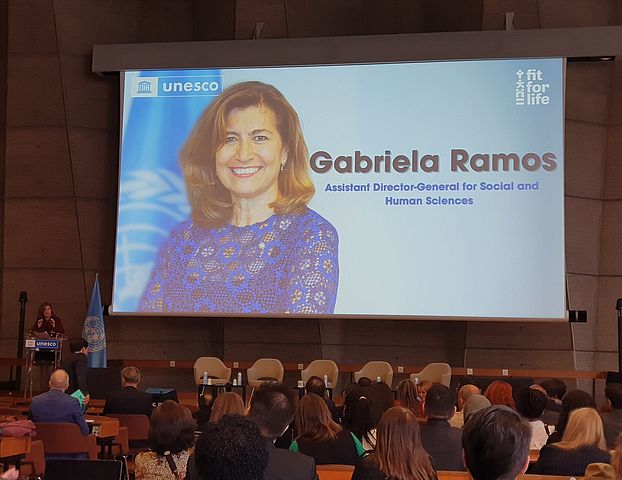CIGEPS 2024 conference in Paris with the participation of the UNESCO Chair on 'Physical Activity and Health in Educational Settings'

The 2024 ordinary session of the Intergovernmental Committee on Physical Education and Sport (CIGEPS) took place on 3 and 4 April 2024 at UNESCO Headquarters in Paris.
The Intergovernmental Committee for Physical Education and Sport (CIGEPS) promotes the role and value of sport and its relevance for public policy. Through CIGEPS, UNESCO has a unique ability to drive government action in the field of sport and physical education and to ensure the implementation of evidence-based physical education and sport policies and programmes, and therefore has the potential to significantly (positively) influence 11 SDGs. The member states as well as private and public organisations were present. The UNESCO Chair of the University of Basel and Nelson Mandela University was also invited to take part in this conference.
The conference was opened by the CIGEPS Chair, H. E. Minister of Sport of Chile, Mr Jaime Pizarro and Ms Gabriela Ramos, Assistant Director-General for Social and Human Sciences at UNESCO. As a follow-up to the Seventh International Conference of Ministers and Senior Officials Responsible for Physical Education and Sport (MINEPS 7), a wide-ranging agenda was developed and worked through, including points such as:
- Gender equality
- Fit for Life label on major sport events
- Quality Physical Education and global survey
- Impact investment in sport
- Fit for Life network against racism
- Youth empowerment through the Fit for Life youth accelerator programme
- Sport and priority Africa
In addition, current processes and (international) projects in the promotion of Quality Physical Education were presented to each other and then discussed, including new methodological approaches within the Fit for Life programme, the flagship of UNESCO. Furthermore, UNESCO has partnered with the Development Bank of Latin America (CAF) and the Chilean Ministry of Sport, with the support of UN Women and the International Olympic Committee, to test investment mechanisms as part of the "Trampolin" pilot project to assess cost savings and risks in sports investments, which is currently being implemented in Chile.
The Chair from the University of Basel, Nelson Mandela University and Swiss Tropical and Public Health Institute sees its expertise and support possibilities in the two UNESCO-driven programmes (1) Fit for Life, and (2) Quality Physical Education (with the two focal points schoolchildren and teachers) aiming to develop new evidence based knowledge through scientific data in the African context, thereby contributing to and informing UNESCO's Priority Africa Sport Strategy (PASS). This is to be achieved through the implementation of the Short Learning Programmes (SLPs) as part of the continuing professional development (CPD) of teachers.
It recognises that cultural diversity in physical education, physical activity and sport includes physical play, recreation, dance, organised sport, recreational sport, competitive sport and traditional and indigenous sports and games. Therefore, the following articles of the UNESCO International Charter on Physical Education, Physical Activity and Sport (adopted in 1978) are relevant to the Chair and its research work and serve as guidelines for future activities and projects:
- Article 4 - Physical education, physical activity and sport programmes must inspire lifelong participation
- Article 6 - Research, evidence and evaluation are indispensable components for the development of physical education, physical activity and sport
- Article 7 - Teaching, coaching and administration of physical education, physical activity and sport must be performed by qualified personnel
- Article 8 - Adequate and safe spaces, facilities and equipment are essential to quality physical education, physical activity and sport
Based on these articles from the International Charter on Physical Education, Physical Activity and Sport, the Chair attempts to prioritise current and planned future activities to support UNESCO with its skills and team expertise. Further information on the CIGEPS conference can be found here.
